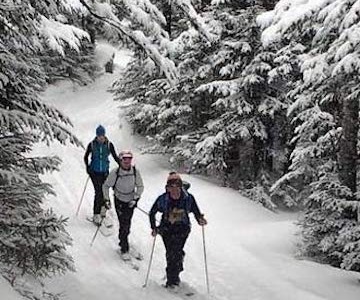WINTER SEASON TRAINING
Triathlete tips
by Carolyn Pfalzgraf, pro triathlete
Landry's customer Carolyn Pfalzgraf competes professionally in triathlon. In these Landry's Triathlete Tips, she shares what she has learned.
"There's a season for everything, even if that means slowing down, re-shifting your focus, and trying new activities."
As the leaves start to fall from the trees and the frost settles on your windowsills, you'll likely be dreading "that time of year again." You've completed your last race, the weather is getting colder, and you're left wondering: "What now?"
Beat the post-tri season blues
Many triathletes fall victim to post-tri season blues, or PTSB, but don't lose hope: there's more to the off-season than sitting around eating Christmas cookies. Quit daydreaming about getting out on your bike again. Instead, think of the off-season as simply different from the rest of the year, and enjoy the fact that you are free to train in a more unstructured regimen (and certainly not as much). This doesn't mean that the off-season is a waste of time. Just the opposite, you'll need to recover both mentally and physically in order to be ready to start strong next season.

Phase your off-season training
There are two phases to the off-season: a few weeks of time completely off of sport, followed by a couple months of off-season training. So kick-back around the holidays, hang out with friends and family, take it easy. You'll likely be antsy a few weeks into your break but ease back into it. In the meantime, try exploring new activities that you wouldn't normally have time to do. Go to few yoga classes, take a hike, try mountain biking, and consider using the winter to explore snow sports. If you're the type that needs structure, focus on imbalances that are hard to correct in-season, such as strength training to improve your core. For example, let's say you usually go for a run in the morning before work, but there are two feet of snow outside. Great! Continue to carve out time for your morning run, but instead of running you can use that time to do strength and core work, such as a few sets of planks, glute bridges, and swim resistance band exercises — even a quick 45-minute yoga session will help. Keep in mind that the necessary strength and core work will vary widely based on your own unique muscle imbalances, but most people will certainly benefit from a bit of workout variety.
To every thing there is a season
Once you start training again, make sure to do so gently — and don't worry about having a specific focus for each workout. Many triathletes love to grind out endless hours on the trainer, but that can be mentally taxing and not even the best use of your time. The great thing about the off-season is that, unless you plan on doing an Ironman in February, you don't have to ride the trainer until your butt is numb. The past two seasons I've made my time on the trainer count, only doing 60–90 minutes at a time with intervals focused on raising my 5-minute and 20-minute power. Instead of long rides, I substituted with cross-country skiing, a highly cardiovascular workout that's low impact, which means you can ski for hours and hours (just like cycling). Not only did I build endurance and keep active, I really began to enjoy the winter weather instead of dreading it! Another great winter activity that complements triathlon training is snowshoe running. You can substitute snowshoeing for some of your easy runs, and maybe even for a transition run after you ski. Plus, if your competitive spirit is always burning, you can even try a cross-country ski or snowshoe race. Now that I've incorporated these types of off-season training into my routine, I actually look forward to winter!
So don't fret once the snow starts to fall along with the temperatures. If the slower pace starts to concern you, keep this in mind: You don't want to burn out in the middle of March because you didn't take enough of an off-season in November and December. There's a season for everything, even if that means slowing down, re-shifting your focus, and trying new activities.
Everything you need to know about triathlons
Learn more from Landry's about the sport of triathlon.
